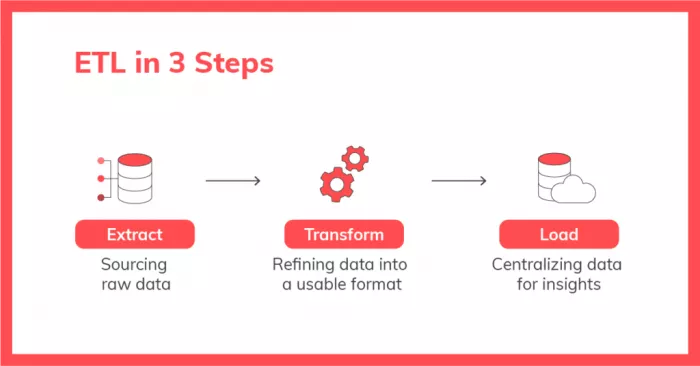Data is the foundation of modern business success. Every interaction, transaction, and customer engagement generates valuable insights. But raw data alone holds little value. Without the right tools and strategies, it remains an untapped resource.
Artificial intelligence (AI) is changing the way businesses use data. Companies can extract meaningful insights, optimize processes, and drive revenue growth with AI-powered solutions. Those who embrace AI-driven data strategies gain a significant competitive advantage.
This article explores the key AI strategies that transform data into actionable intelligence. From automating data management with ETL to improving decision-making, personalizing customer experiences, and enhancing security, AI unlocks the true power of information.
The Value of Data in Business Success
Data is often called the "new oil," but its value depends on how effectively it is refined and used. Businesses across industries generate vast amounts of data daily, yet many struggle to organize and analyze it efficiently. Poor data quality, fragmented information systems, and slow processing times create significant roadblocks.
AI helps overcome these challenges by streamlining data collection, cleaning, and analysis. With AI-driven automation, businesses can access real-time insights, improve operational efficiency, and make informed decisions. Companies that fail to leverage AI risk falling behind, while those that do gain a clear edge in a data-driven economy.
AI-Powered ETL: Laying the Foundation for Data Transformation
What is ETL (Extract, Transform, Load)?

Before data can be analyzed and used effectively, it must be gathered, processed, stored, and organized. This is where ETL—Extract, Transform, Load—comes into play. ETL pulls data from multiple sources, cleans and structures it, and loads it into a central database or data warehouse.
Traditional ETL methods rely on manual processes and predefined rules, which can be slow and error-prone. AI enhances ETL by automating data extraction, intelligently transforming raw information, and ensuring seamless integration across systems.
How AI Enhances ETL Processes
AI-powered ETL tools eliminate inefficiencies by automating complex tasks. Instead of relying on predefined rules, AI adapts and learns from data patterns, improving accuracy over time. It can detect and correct inconsistencies, remove duplicates, and integrate data from multiple sources with minimal human intervention.
This means cleaner, more reliable data processing faster and at scale for businesses. AI-driven ETL makes real-time analytics possible, allowing companies to respond more efficiently to trends and market shifts.
AI-Driven Analytics for Smarter Decision-Making
Having well-organized data is just the beginning. AI takes analytics to the next level by uncovering patterns, predicting trends, and providing actionable insights.
Predictive analytics uses historical data to forecast future outcomes. Businesses use AI models to anticipate customer behavior, optimize inventory, and identify market trends before they happen. Instead of reacting to changes, companies can proactively adjust strategies to maximize success.
Prescriptive analytics goes a step further by recommending specific actions. AI can suggest the best pricing strategy based on demand fluctuations, identify ideal marketing campaigns for customer segments, or optimize resource allocation. Businesses that leverage AI-powered analytics make data-driven decisions faster and more accurately than ever.
Process Automation with AI for Maximum Efficiency
AI transforms business operations by automating repetitive tasks, reducing costs, and improving efficiency. In many industries, robotic process automation (RPA) powered by AI handles administrative work, financial transactions, and customer service requests with remarkable speed and precision.
In customer support, AI chatbots and virtual assistants provide instant responses, handle inquiries, process orders, and troubleshoot problems without human intervention. These AI-driven systems improve customer experiences while reducing operational costs.
AI is also revolutionizing supply chain management. Logistics companies use AI to predict demand, optimize routes, and reduce delivery delays. Inventory systems powered by AI automatically adjust stock levels based on sales data, preventing overstocking or shortages.
By automating key processes, businesses can operate more efficiently, reduce errors, and free employees to focus on strategic initiatives rather than routine tasks.
Personalization and Revenue Growth with AI
AI-driven personalization is changing the way businesses interact with customers. Today's consumers expect tailored experiences, and AI makes it possible to deliver them at scale.
AI can analyze customer behavior to create highly targeted marketing campaigns that drive engagement and sales. E-commerce platforms use AI to recommend products based on browsing history while streaming services curate personalized content for users. These AI-driven recommendations not only improve customer satisfaction but also increase conversion rates.
Dynamic pricing is another AI-powered revenue-boosting strategy. Airlines, hotels, and retailers adjust prices in real-time based on demand, competitor pricing, and customer behavior. AI analyzes vast amounts of data to determine the optimal price point, maximizing profitability without sacrificing customer loyalty.
Businesses that embrace AI for personalization see higher customer retention, stronger brand loyalty, and increased revenue opportunities.
AI and Data Security: Protecting Your Gold
Vast amounts of data come with the responsibility to protect them. AI plays a crucial role in cybersecurity by detecting threats, preventing fraud, and ensuring compliance with data regulations.
AI-powered fraud detection systems analyze real-time transactions, identifying suspicious activities before they escalate. Banks and financial institutions rely on AI to detect unusual patterns that could indicate fraudulent behavior, helping to prevent economic losses.
Data privacy regulations like GDPR and CCPA require businesses to manage personal data responsibly. AI assists in monitoring compliance, identifying vulnerabilities, and automating data protection processes. Companies can safeguard sensitive information by integrating AI into security measures while maintaining customer trust.
Conclusion
Data is a powerful asset, but only if it is used strategically. AI-driven solutions transform raw data into meaningful insights, helping businesses improve efficiency, increase revenue, and enhance customer experiences.
AI unlocks new business possibilities across industries, from automating ETL processes to enabling more intelligent analytics, optimizing operations, and personalizing interactions. Companies that adopt AI-driven strategies gain a competitive advantage, while those that ignore AI risk being left behind.
The future of business is data-driven, and AI is the key to unlocking its full potential. Now is the time to embrace AI and turn your data into gold.
Post Comment
Be the first to post comment!




